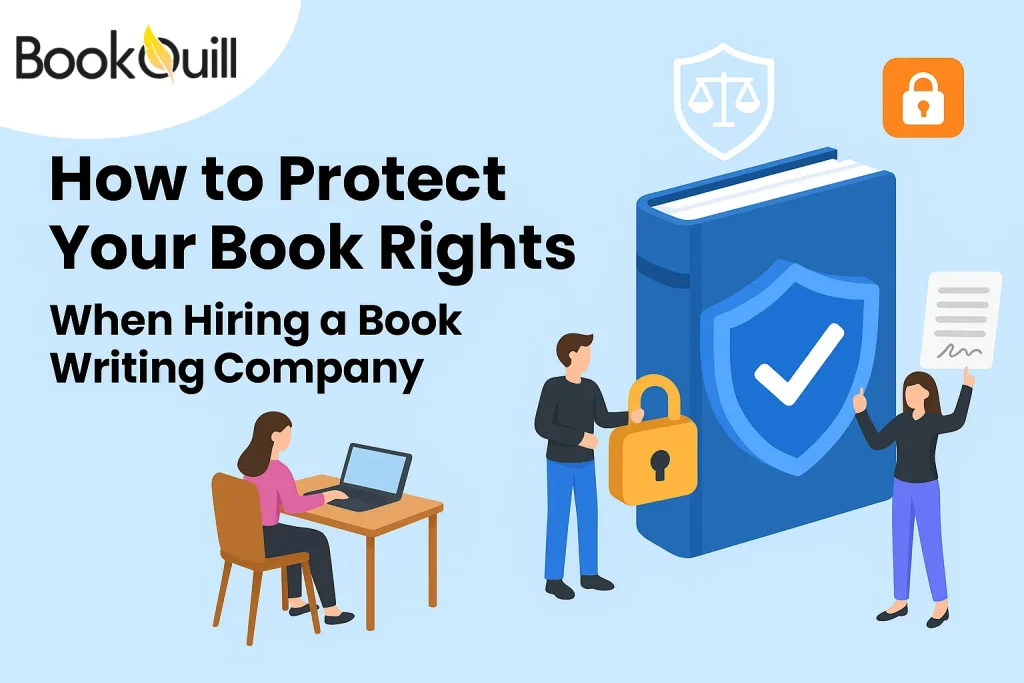Table of Contents
Explore Blogs
Trending on Ebook
How to Protect Your Book Rights When Hiring a Book Writing Company

I’ve never written a book myself, so I can’t say exactly what it feels like. But I imagine an author’s mind looks something like a flowchart. Each box holds a plot point. Arrows connect scenes. Everything is moving, branching, building.
Then come the ideas. More and more of them. So many that the structure starts to overflow. The lines get messy. Boxes blur together. It gets harder to hold onto what goes where. At that point, it makes perfect sense to focus only on finishing the book. This is when they take help from experts, too, but the problem that comes with it is about book rights.
This is something many authors don’t think about. However, it can lead to trouble later, like losing control over your work, dealing with legal issues, or missing out on money from book sales.
You can protect most rights if you follow these steps.
In this blog, I’ll Walk you through simple steps to protect your rights when hiring a book-writing company. Whether you’re working with experts or budget-friendly companies, you need to be aware of what’s legally yours and how to make sure it stays that way.
So, let’s see how you can make sure your ideas stay safe, yours, and profitable.
Key Takeaways
- Book Rights Mean Ownership: They cover more than just copyright. These rights include publishing, selling, translating, and turning your book into movies or shows.
- Always Read Contracts Closely: Before signing, look for clear ownership clauses, work-for-hire terms, and details on royalties or licensing.
- Use Legal Protection Tools: Secure your rights with a non-disclosure agreement (NDA), copyright transfer document, and a work-for-hire contract.
- Ask the Right Questions: Don’t hesitate to ask about AI usage, originality guarantees, cancellation policies, and ownership terms before you commit.
- Choose Reputable Companies Only: The best ghostwriting companies are transparent, communicative, and offer detailed contracts that favor your ownership.
- Avoid Red Flags: If the contract is unclear or the company avoids your questions, it’s best to walk away. A cheap deal can end up costing more later.
Starting from the Basics: What Exactly Are Book Rights?
Think of them as the official “ownership papers” for your book. They decide who can print it, sell it, translate it, turn it into a movie, or share it anywhere else.
When you write a book yourself, you automatically own those rights. But when you bring in outside help like professional ghostwriting services, that’s where things can get tricky.
There are a few main types of rights every author should know:
- Publishing Rights: This lets you (or your chosen publisher) print and sell your book. If you give this up, someone else can publish your story without you earning anything.
- Distribution Rights: This covers how your book gets into bookstores, libraries, or online retailers like Amazon or Apple Books.
- Adaptation Rights: Want your story turned into a movie, TV series, or even a podcast? These rights control that. Selling them early (or by accident) can cost you a huge opportunity later.
The important part? If you don’t have clear agreements in place, you might not legally own your own book, even if you paid for it.
For example, J.K. Rowling was negotiating publishing deals, and she refused to sell her digital publishing rights. Years later, she launched Wizarding World and earned millions from ebook and audio-book sales, because she kept those rights.
Now that we understand what book rights are, let’s talk about how you can protect them before signing anything. Knowing what to look for in a contract can save you from major headaches later.
Know Your Book Rights Before You Sign Anything
When you write something, an article, blog, or book, it’s automatically copyrighted under U.S. law. According to the U.S. Copyright Office, your writing doesn’t need to be registered to be protected. But if someone else writes it for you (like a ghostwriter), the rights can get blurry if there’s no contract.
Without a clear contract, your ghostwriter could technically claim they co-own your work.
Did You Know?
Famous chef and author Julia Child often collaborated with others on her books. She always had contracts that clarified who owned what. That helped her avoid legal issues later, even when her brand became global.
That’s why knowing the difference between these two is key.
- Work for Hire: You pay them. You own it. No rights issues.
- Copyright Assignment: They give up their rights and assign them to you in writing.
Red Flags to Watch for Before Signing a Contract
So now that you know what to expect legally, let’s talk about the contract – the part where things often go wrong.
Hiring the best ghostwriting services can feel exciting. But that feeling can quickly fade when you’re staring at a 10-page contract filled with confusing terms and fine print. This is where many authors trip up.
Let’s break down some of the most common red flags to watch for:
No clear ownership clauses
If the contract doesn’t clearly say that you retain your book rights, stop right there. That’s your story, and you should own it, no matter who helps you write it.
Exclusive vs. Non-Exclusive Terms
Exclusive means the company is the only one allowed to distribute or sell your book. That could lock you in. Non-exclusive gives you more freedom to publish elsewhere. Always know what you’re agreeing to.
Royalties and Licensing Confusion
Are they taking a cut of your earnings? For how long? Are they licensing your work to others without telling you? Don’t sign anything unless the terms of money and rights are crystal clear.
Ghostwriting Credit
Some of the best ghost writing companies quietly insert clauses saying they get partial credit for the book. If you’re paying for full authorship, make sure that’s reflected in the contract.
Missing Revision or Cancellation Policies
What if you don’t like the first draft? Or want to walk away mid-project? A good contract will outline how revisions are handled and what happens if you cancel.
Many authors think reading the basic rules for writers’ books will prepare them for this, but it rarely covers legal loopholes like these. That’s why it’s important to take your time, ask questions, and read every word.
Note: If a company pressures you to sign fast or seems nervous about giving you time to review, consider that a warning sign.
Legal Protections You Must Have in Place
By now, you know what book rights are and what to avoid in a contract. But even with a solid agreement, there are a few more things you need to lock in to stay legally protected, especially when working with affordable ghostwriting services or freelance writers online.
Here are the essential legal tools you should have in place before starting any project:
Copyright Registration
Your work is technically copyrighted the moment it’s written, but to take legal action if someone misuses it, you need to register your copyright with the U.S. Copyright Office. It’s a simple process that costs around $45–$65 and gives you legal proof that the content belongs to you.
NDA (Non-Disclosure Agreement)
If you’re sharing a personal story, business idea, or research, an NDA protects that information. It stops the ghostwriter or company from sharing, selling, or using your idea elsewhere.
A good NDA will cover:
- Your story idea
- Any research or personal content you provide
- The final manuscript and drafts
Without this, there’s nothing stopping someone from reusing your idea with another client.
Work-for-Hire Clause
This clause should clearly state that the writer is being paid to create content that you fully own. It’s one of the strongest ways to avoid any future ownership claims.
Clear Payment and Refund Terms
Make sure your contract spells out what happens if you’re unhappy with the draft, if delays happen, or if you decide to cancel. Vague payment terms are a red flag, and they rarely work in your favor.
Legal Permission for Any Extra Materials
Did the company use quotes, song lyrics, or images in your book? Make sure they have legal permission to use those. Otherwise, you could face copyright issues, even if you didn’t write that part.
In 2013, author Sherrilyn Kenyon filed a lawsuit against another writer for allegedly copying characters and plot elements from her Dark-Hunter series. The case highlighted just how serious copyright infringement can be, even when the author isn’t the one who used the content. It’s your name on the book, so you’re responsible for what’s inside it.
We’ve Covered a Lot, But There’s More You Should Know
You’ve made it this far, and by now you’re probably thinking, “Okay, I get the legal side… so is there anything else I should be doing?”
Well, yes. There are a few extra but powerful steps you can take to make sure you stay in control of your book, no matter who helps you write it.
Always Get a Copyright Transfer in Writing
Even if you paid for the writing service, don’t assume the copyright is yours. Make sure you get a simple one-page document that includes:
- The full name of the ghostwriter or agency
- A statement that all rights are being transferred to you
- The project title or description
- Date and signatures from both sides
Tip: You can register your book with the U.S. Copyright Office online for $65. It’s fast, easy, and gives you official proof of ownership. Here’s the official site where you can do it.
Even the best ghostwriting services and major publishers like HarperCollins require authors to confirm rights ownership. You should do the same.
Don’t Skip the Paper Trail
Save everything, including:
- Emails confirming work arrangements
- Invoices and payment receipts
- Draft versions of your manuscript
- Feedback you gave and received
In case there’s ever a disagreement later, these records will show:
- The timeline of who did what
- That the ideas and edits came from you
- That payment was completed
This also applies if you’re working with professional ghostwriting services. Reputable companies will keep thorough documentation. Make sure you do too.
Watch Out for International Rights
If you’re planning to translate your book or sell it internationally, ask about book rights in other languages or countries.
Make sure the contract says:
- You own the translation rights
- You can sell your book in any region
- You can publish with any distributor
Without this, the company could block future deals or ask for royalties later.
Wrap Up
Hiring a book-writing company can be one of the smartest moves you can make, but only when you do it right, by protecting your book rights from day one.
Don’t leave anything to chance. Read contracts carefully, ask the hard questions, and get everything in writing. Whether you’re working with high-end or affordable ghostwriting services, your voice and your vision should stay yours.
Make sure the rights are transferred, keep records, and ask about NDAs and royalties before paying a dime.
Your story deserves to be in your name, on your terms.
With these tips, you’ll avoid common traps and build a strong foundation for your book, something you can proudly share with the world and profit from for years to come.
You worked hard for your ideas. Make sure they stay yours.
Frequently Asked Questions
Still have questions? Let’s cover some of the most common ones that authors usually ask before and after hiring a writing company.
What is the difference between copyright and book rights?
Copyright is part of book rights. But rights can include things beyond just the words—like film rights, translation rights, etc.
How do I know if a ghostwriter is giving up their rights?
Ask directly and check the contract. If it says “work for hire,” it usually means you own the work. Always get it in writing.
Can books be copyrighted if written by a ghostwriter?
Yes. As long as the ghostwriter signs over the rights, you can register the book under your name.
Are affordable ghostwriting services less reliable in protecting rights?
Not always, but cheaper services may sometimes have less clear contracts. It’s important to review terms regardless of price.
What should I do if my rights are violated?
Gather evidence, review your contract, and consult a legal professional for guidance on enforcing your rights.
About Author
Hi My name is Micheal Adams, When I am not watching horror movies and helping my kids with homework or reading my favorite fantasy/supernatural novels – I’m writing to guide aspiring authors. I focus on exploring and simplifying both the technical aspects and the often-overlooked details of book writing and publishing so I can empower new writers to climb the Amazon bestseller list and connect with more readers.




